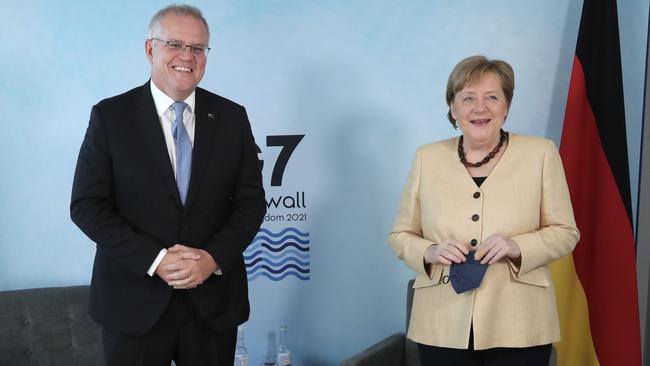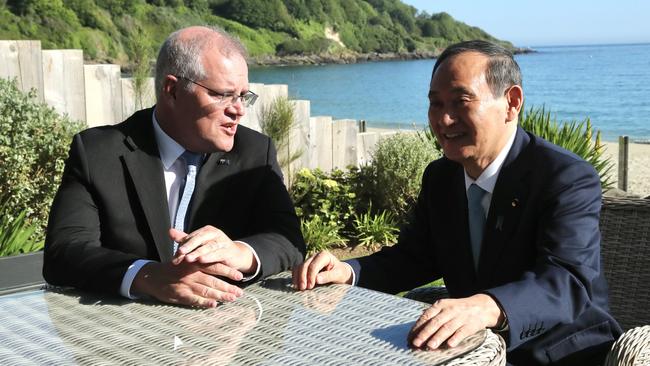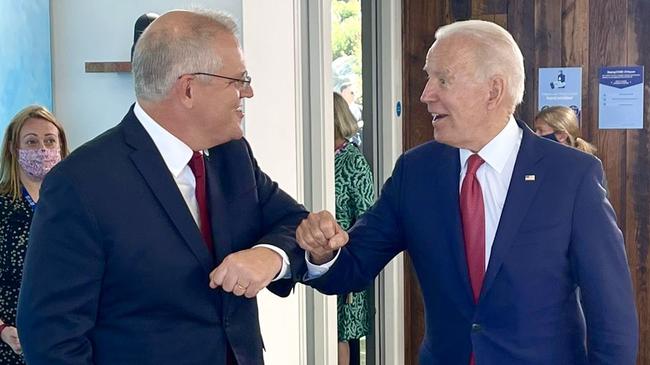Allies rally to Scott Morrison’s call on China
Scott Morrison has won the support of the world’s biggest democracies in pushing back against growing Chinese power.
Scott Morrison has won the support of the world’s biggest democracies and Australia’s wartime allies – the US and Britain – in pushing back against growing Chinese power and influence in the Indo-Pacific region.
The Prime Minister raised China’s list of 14 grievances against Australia in his private address to leaders on the final day of the G7 summit, setting-out “very clearly that there are differences in world view”.
Mr Morrison said while the Chinese embassy’s list of grievances was not a surprise to G7 leaders given recent tensions with Australia, “there was obviously a lot of interest about the reasons for that”.
“And they may never be able to be resolved. But living with China, which is the goal, also requires us to be very clear about what our values are, what our principles are, how our countries are run. And how we will continue to run,” Mr Morrison told The Australian.
Speaking before flying into London on Sunday night, Mr Morrison said Australia was not alone in sharing similar experiences with China, “particularly those who are more familiar with the region, who have had greater engagement with the region”.
“There are European countries that have been through similar periods as Australia.
But the way through that is just to be patient,” he said.
“Keep seeking what the ultimate goal is, to be consistent and clear and resolute in the positions that you hold but with the objective of getting to a point where we once again can engage in the dialogue and the partnership that we have in the past.
“But not at the cost or the price of any of the issues that were set out on those 14 points being conceded.”

The summit has already delivered two pointed messages to Beijing, with G7 leaders announcing a global infrastructure plan to rival China’s controversial Belt and Road Initiative and the World Health Organisation demanding more transparency over the origin of the coronavirus.
“There were difficulties in data sharing, especially raw data … (we) hope the next phase there will be better co-operation and transparency,” the WHO’s director-general, Tedros Adhanom Ghebreyesus, said.
The G7 communique released at the end of the three-day summit in the Cornish seaside resort village of Carbis Bay called out China over poor behaviour including human rights abuses.
In brief comments before a bilateral meeting with Mr Morrison on Sunday, Italian Prime Minister Mario Draghi said “the only difference in views (at the G7) was the intensity of the message to China”, reflecting hesitation by some European nations in escalating tensions with Beijing.
Mr Morrison said some European nations had a “different perspective because of their geography”.
“They have a different perspective because of their economies. We have a different perspective because we live in the Indo-Pacific and so our economies are integrated into the Indo Pacific differently to what they are in Europe.”
“But that’s changing rapidly. What I detected was an increasing and significant awareness of the impact of tensions in the Indo-Pacific for the broader global system and that in particular relates to Europe.
“There was a very high level of awareness and a very strong level of support for what has been a very consistent and clear stand that Australia has taken. Consistent with our democratic values which are shared by all of those who joined in the discussions these past few days.”
Responding to comments made by British Prime Minister Boris Johnson that a sensible person wouldn’t discount that Covid-19 could have come from a lab, Mr Morrison said the second phase of the World Health Organisation into the origins of the pandemic was “already overdue”.
“I can’t tell you how it’s sourced. I don’t know. That’s the point, we don’t know and all the potential sources should be obviously understood. And for another reason so we know how we might be able to handle this better in the future.”
Mr Morrison has supported a global early warning system to provide nations early advice at the onset of a pandemic and for the WHO to be handed weapons-inspector style powers.
Historic trilateral meeting
Mr Morrison’s G7-plus speech came after a historic meeting with Joe Biden and Boris Johnson on the sidelines of the summit in the Cornish resort of Carbis Bay where they spoke of escalating tensions in the Indo-Pacific and the need to work closely in response to those threats.
A planned first in-person meeting between Mr Morrison and Mr Biden, where they were set to discuss defence and strategic partnerships across security, climate change and supply chains, was scaled-up 24 hours before the talks, with Australia, the US and UK coming together for a rare trilateral meeting.

That meeting followed a separate catch-up between Mr Morrison and Mr Johnson at the British leaders’ residence.
After the talks, Mr Biden and Mr Morrison walked together to the G7-plus leaders’ family photo before a joint US-Britain-Australia statement was released.
“They discussed a number of issues of mutual concern, including the Indo-Pacific region. They agreed that the strategic context in the Indo-Pacific was changing and that there was a strong rationale for deepening co-operation between the three governments,” the joint statement said.
Mr Morrison and Japanese Prime Minister Yoshihide Suga – another key player in the region – shared breakfast and a beach walk together on the final day of the summit, discussing regional security and climate partnerships.
The Indo-Pacific step-up, Beijing’s economic coercion of countries including Australia, and increasing disinformation and cyber campaigns linked to China and Russia have been a key focus at the G7-plus leaders’ summit.
Mr Morrison said the meeting with Mr Biden and Mr Johnson had allowed them “to discuss the Indo-Pacific situation more broadly”. “Australia has no greater friends than the United States and the United Kingdom and we’ve been working together on our respective security issues for a very long time,” he said of the Australia-US-UK leaders’ meeting.
“We had a good opportunity to talk about those and look to see how we can further co-operate in the future. The situation only reinforces the need for us to have deeper co-operation.” The Prime Minister was due to fly to London on Sunday night, ahead of an address to business leaders at an Australian British Chamber of Commerce breakfast on Monday and planned meetings with national security agency heads at MI6, Bank of England governor Andrew Bailey and senior ministers including British Chancellor Rishi Sunak and Foreign Secretary Dominic Raab.
Following a NATO summit on Monday – where Mr Biden will agitate for the security alliance to refocus its mission towards new global threats – Mr Johnson will return to London for a dinner with Mr Morrison.

The pair will meet at Downing Street on Tuesday morning, where an initial plan for them to sign an in-principle agreement is now unlikely to occur. Mr Morrison is also expected to meet with the Queen at Windsor Castle on Tuesday.
Speaking to G7 leaders and guests in an earlier session on health and pandemic preparedness, Mr Morrison backed a global early warning system for pandemics and a 100-day plan proposed at the summit.
The Australian understands Mr Morrison won support – which was expected to be reflected in the final G7 communique – in relation to his calls for the World Health Organisation to be bolstered with new powers similar to those of weapons inspectors.
Mr Morrison also declared “more work” needed to be done to determine the origins of Covid-19, with global investigations focused on whether it had natural origins or may have leaked from a lab.
Australia’s early push to investigate the cause of the Covid-19 pandemic led to a rapid deterioration of economic relations with China, as Beijing imposed significant tariffs on imports of wine, beef, coal and barley.
“It’s very important that we understand the origins and there has already been discussion around our preparedness for any future pandemic that the world can move quickly on issues like vaccines,” Mr Morrison said, adding the purpose of the inquiries had nothing to do with “politics or frankly blame”.
“It’s about understanding it so we all on a future occasion can move quickly and can avoid on a future occasion the absolute carnage that we’ve seen from this pandemic,” he said.
“The process we called for is not yet done, it is recommending further work. And recommending that there be further powers for the WHO to be able to identify these things early, and ensure that information is passed on in a timely way.”

Mr Morrison, who confirmed climate change was not the subject of his discussions with Mr Biden and Mr Johnson, said Australia’s alliance with the US and UK “has never been stronger”.
“It was a meeting of great friends and allies who share a view on the world. It was a great opportunity for my first meeting, of course, with the President. I’ve known Boris for many years.
“And there was a very easy understanding amongst the three of us. As liberal democracies with a great history of friendship and partnership and a shared view on the world and its challenges, and strategic challenges at that.
“We are very conscious of the environment we face but whatever that environment is we’ll always face it together.”
Mr Johnson has dramatically ramped-up Britain’s military presence in the Indo-Pacific, including sending a naval carrier strike group led by aircraft carrier HMS Queen Elizabeth on a 28-week maiden voyage, including movements through the South China Sea and Philippine Sea.
Mr Morrison said Australia’s handling of the Chinese economic relationship was based on being “consistent”.
“We are for a stable and peaceful and open Indo-Pacific. That’s in everybody’s interests,” he said.
“It’s in Australia’s interests, it’s in China’s interests. And for the free trade that can occur throughout the region.”








To join the conversation, please log in. Don't have an account? Register
Join the conversation, you are commenting as Logout